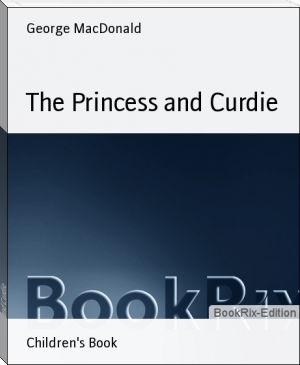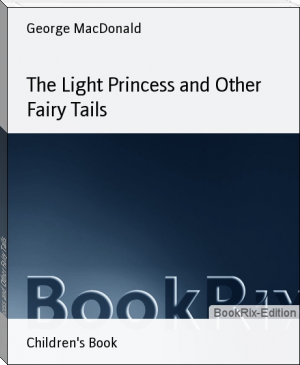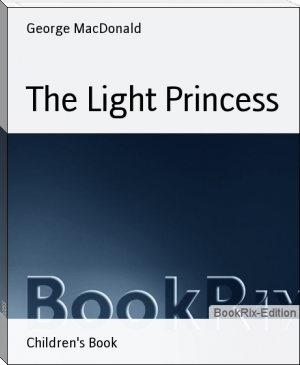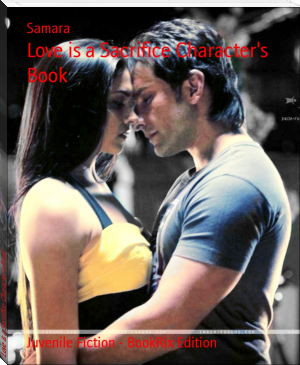The Princess and Curdie by George MacDonald (life changing books .txt) 📖

Download in Format:
- Author: George MacDonald
Book online «The Princess and Curdie by George MacDonald (life changing books .txt) 📖». Author George MacDonald
hen, scratching at the thread, which to Curdie was of course invisible across the moonlight. Indeed Curdie laughed within himself, just a little, at the sight; and when he thought of how the princess used to talk about her huge, great, old grandmother, he laughed more. But that moment the little lady leaned forward into the moonlight, and Curdie caught a glimpse of her eyes, and all the laugh went out of him.
'What do you come here for, Curdie?' she said, as gently as before.
Then Curdie remembered that he stood there as a culprit, and worst of all, as one who had his confession yet to make. There was no time to hesitate over it.
'Oh, ma'am! See here,' he said, and advanced a step or two, holding out the pigeon.
'What have you got there?' she asked.
Again Curdie advanced a few steps, and held out his hand with the pigeon, that she might see what it was, into the moonlight. The moment the rays fell upon it the pigeon gave a faint flutter. The old lady put out her old hands and took it, and held it to her bosom, and rocked it, murmuring over it as if it were a sick baby.
When Curdie saw how distressed she was he grew sorrier still, and said: 'I didn't mean to do any harm, ma'am. I didn't think of its being yours.'
'Ah, Curdie! If it weren't mine, what would become of it now?' she returned. 'You say you didn't mean any harm: did you mean any good, Curdie?'
'No,' answered Curdie.
'Remember, then, that whoever does not mean good is always in danger of harm. But I try to give everybody fair play; and those that are in the wrong are in far more need of it always than those who are in the right: they can afford to do without it. Therefore I say for you that when you shot that arrow you did not know what a pigeon is. Now that you do know, you are sorry. It is very dangerous to do things you don't know about.'
'But, please, ma'am - I don't mean to be rude or to contradict you,' said Curdie, 'but if a body was never to do anything but what he knew to be good, he would have to live half his time doing nothing.'
'There you are much mistaken,' said the old quavering voice. 'How little you must have thought! Why, you don't seem even to know the good of the things you are constantly doing. Now don't mistake me. I don't mean you are good for doing them. It is a good thing to eat your breakfast, but you don't fancy it's very good of you to do it. The thing is good, not you.'
Curdie laughed.
'There are a great many more good things than bad things to do. Now tell me what bad thing you have done today besides this sore hurt to my little white friend.' While she talked Curdie had sunk into a sort of reverie, in which he hardly knew whether it was the old lady or his own heart that spoke. And when she asked him that question, he was at first much inclined to consider himself a very good fellow on the whole. 'I really don't think I did anything else that was very bad all day,' he said to himself. But at the same time he could not honestly feel that he was worth standing up for. All at once a light seemed to break in upon his mind, and he woke up and there was the withered little atomy of the old lady on the other side of the moonlight, and there was the spinning wheel singing on and on in the middle of it!
'I know now, ma'am; I understand now,' he said. 'Thank you, ma'am, for spinning it into me with your wheel. I see now that I have been doing wrong the whole day, and such a many days besides! Indeed, I don't know when I ever did right, and yet it seems as if I had done right some time and had forgotten how. When I killed your bird I did not know I was doing wrong, just because I was always doing wrong, and the wrong had soaked all through me.'
'What wrong were you doing all day, Curdie? It is better to come to the point, you know,' said the old lady, and her voice was gentler even than before.
'I was doing the wrong of never wanting or trying to be better. And now I see that I have been letting things go as they would for a long time. Whatever came into my head I did, and whatever didn't come into my head I didn't do. I never sent anything away, and never looked out for anything to come. I haven't been attending to my mother - or my father either. And now I think of it, I know I have often seen them looking troubled, and I have never asked them what was the matter. And now I see, too, that I did not ask because I suspected it had something to do with me and my behaviour, and didn't want to hear the truth. And I know I have been grumbling at my work, and doing a hundred other things that are wrong.'
'You have got it, Curdie,' said the old lady, in a voice that sounded almost as if she had been crying. 'When people don't care to be better they must be doing everything wrong. I am so glad you shot my bird!'
'Ma'am!' exclaimed Curdie. 'How can you be?'
'Because it has brought you to see what sort you were when you did it, and what sort you will grow to be again, only worse, if you don't mind. Now that you are sorry, my poor bird will be better. Look up, my dovey.'
The pigeon gave a flutter, and spread out one of its red-spotted wings across the old woman's bosom.
'I will mend the little angel,' she said, 'and in a week or two it will be flying again. So you may ease your heart about the pigeon.'
'Oh, thank you! Thank you!' cried Curdie. 'I don't know how to thank you.'
'Then I will tell you. There is only one way I care for. Do better, and grow better, and be better. And never kill anything without a good reason for it.'
'Ma'am, I will go and fetch my bow and arrows, and you shall burn them yourself.'
'I have no fire that would burn your bow and arrows, Curdie.'
'Then I promise you to burn them all under my mother's porridge pot tomorrow morning.'
'No, no, Curdie. Keep them, and practice with them every day, and grow a good shot. There are plenty of bad things that want killing, and a day will come when they will prove useful. But I must see first whether you will do as I tell you.'
'That I will!' said Curdie. 'What is it, ma'am?'
'Only something not to do,' answered the old lady; 'if you should hear anyone speak about me, never to laugh or make fun of me.'
'Oh, ma'am!' exclaimed Curdie, shocked that she should think such a request needful.
'Stop, stop,' she went on. 'People hereabout sometimes tell very odd and in fact ridiculous stories of an old woman who watches what is going on, and occasionally interferes. They mean me, though what they say is often great nonsense. Now what I want of you is not to laugh, or side with them in any way; because they will take that to mean that you don't believe there is any such person a bit more than they do. Now that would not be the case - would it, Curdie?'
'No, indeed, ma'am. I've seen you.'
The old woman smiled very oddly.
'Yes, you've seen me,' she said. 'But mind,' she continued, 'I don't want you to say anything - only to hold your tongue, and not seem to side with them.'
'That will be easy,'said Curdie,'now that I've seen you with my very own eyes, ma'am.'
'Not so easy as you think, perhaps,' said the old lady, with another curious smile. 'I want to be your friend,' she added after a little pause, 'but I don't quite know yet whether you will let me.' 'Indeed I will, ma'am,' said Curdie.
'That is for me to find out,' she rejoined, with yet another strange smile. 'in the meantime all I can say is, come to me again when you find yourself in any trouble, and I will see what I can do for you - only the canning depends on yourself. I am greatly pleased with you for bringing me my pigeon, doing your best to set right what you had set wrong.'
As she spoke she held out her hand to him, and when he took it she made use of his to help herself up from her stool, and - when or how it came about, Curdie could not tell - the same instant she stood before him a tall, strong woman - plainly very old, but as grand as she was old, and only rather severe-looking. Every trace of the decrepitude and witheredness she showed as she hovered like a film about her wheel, had vanished. Her hair was very white, but it hung about her head in great plenty, and shone like silver in the moonlight. Straight as a pillar she stood before the astonished boy, and the wounded bird had now spread out both its wings across her bosom, like some great mystical ornament of frosted silver.
'Oh, now I can never forget you!' cried Curdie. 'I see now what you really are!'
'Did I not tell you the truth when I sat at my wheel?' said the old lady.
'Yes, ma'am,' answered Curdie.
'I can do no more than tell you the truth now,' she rejoined. 'It is a bad thing indeed to forget one who has told us the truth. Now go.'
Curdie obeyed, and took a few steps toward the door. 'Please, ma'am - what am I to call you?' he was going to say; but when he turned to speak, he saw nobody. Whether she was there or not he could not tell, however, for the moonlight had vanished, and the room was utterly dark. A great fear, such as he had never before known, came upon him, and almost overwhelmed him. He groped his way to the door, and crawled down the stair - in doubt and anxiety as to how he should find his way out of the house in the dark. And the stair seemed ever so much longer than when he came up. Nor was that any wonder, for down and down he went, until at length his foot struck a door, and when he rose and opened it, he found himself under the starry, moonless sky at the foot of the tower.
He soon discovered the way out of the garden, with which he had some acquaintance already, and in a few minutes was climbing the mountain with a solemn and cheerful heart. It was rather
'What do you come here for, Curdie?' she said, as gently as before.
Then Curdie remembered that he stood there as a culprit, and worst of all, as one who had his confession yet to make. There was no time to hesitate over it.
'Oh, ma'am! See here,' he said, and advanced a step or two, holding out the pigeon.
'What have you got there?' she asked.
Again Curdie advanced a few steps, and held out his hand with the pigeon, that she might see what it was, into the moonlight. The moment the rays fell upon it the pigeon gave a faint flutter. The old lady put out her old hands and took it, and held it to her bosom, and rocked it, murmuring over it as if it were a sick baby.
When Curdie saw how distressed she was he grew sorrier still, and said: 'I didn't mean to do any harm, ma'am. I didn't think of its being yours.'
'Ah, Curdie! If it weren't mine, what would become of it now?' she returned. 'You say you didn't mean any harm: did you mean any good, Curdie?'
'No,' answered Curdie.
'Remember, then, that whoever does not mean good is always in danger of harm. But I try to give everybody fair play; and those that are in the wrong are in far more need of it always than those who are in the right: they can afford to do without it. Therefore I say for you that when you shot that arrow you did not know what a pigeon is. Now that you do know, you are sorry. It is very dangerous to do things you don't know about.'
'But, please, ma'am - I don't mean to be rude or to contradict you,' said Curdie, 'but if a body was never to do anything but what he knew to be good, he would have to live half his time doing nothing.'
'There you are much mistaken,' said the old quavering voice. 'How little you must have thought! Why, you don't seem even to know the good of the things you are constantly doing. Now don't mistake me. I don't mean you are good for doing them. It is a good thing to eat your breakfast, but you don't fancy it's very good of you to do it. The thing is good, not you.'
Curdie laughed.
'There are a great many more good things than bad things to do. Now tell me what bad thing you have done today besides this sore hurt to my little white friend.' While she talked Curdie had sunk into a sort of reverie, in which he hardly knew whether it was the old lady or his own heart that spoke. And when she asked him that question, he was at first much inclined to consider himself a very good fellow on the whole. 'I really don't think I did anything else that was very bad all day,' he said to himself. But at the same time he could not honestly feel that he was worth standing up for. All at once a light seemed to break in upon his mind, and he woke up and there was the withered little atomy of the old lady on the other side of the moonlight, and there was the spinning wheel singing on and on in the middle of it!
'I know now, ma'am; I understand now,' he said. 'Thank you, ma'am, for spinning it into me with your wheel. I see now that I have been doing wrong the whole day, and such a many days besides! Indeed, I don't know when I ever did right, and yet it seems as if I had done right some time and had forgotten how. When I killed your bird I did not know I was doing wrong, just because I was always doing wrong, and the wrong had soaked all through me.'
'What wrong were you doing all day, Curdie? It is better to come to the point, you know,' said the old lady, and her voice was gentler even than before.
'I was doing the wrong of never wanting or trying to be better. And now I see that I have been letting things go as they would for a long time. Whatever came into my head I did, and whatever didn't come into my head I didn't do. I never sent anything away, and never looked out for anything to come. I haven't been attending to my mother - or my father either. And now I think of it, I know I have often seen them looking troubled, and I have never asked them what was the matter. And now I see, too, that I did not ask because I suspected it had something to do with me and my behaviour, and didn't want to hear the truth. And I know I have been grumbling at my work, and doing a hundred other things that are wrong.'
'You have got it, Curdie,' said the old lady, in a voice that sounded almost as if she had been crying. 'When people don't care to be better they must be doing everything wrong. I am so glad you shot my bird!'
'Ma'am!' exclaimed Curdie. 'How can you be?'
'Because it has brought you to see what sort you were when you did it, and what sort you will grow to be again, only worse, if you don't mind. Now that you are sorry, my poor bird will be better. Look up, my dovey.'
The pigeon gave a flutter, and spread out one of its red-spotted wings across the old woman's bosom.
'I will mend the little angel,' she said, 'and in a week or two it will be flying again. So you may ease your heart about the pigeon.'
'Oh, thank you! Thank you!' cried Curdie. 'I don't know how to thank you.'
'Then I will tell you. There is only one way I care for. Do better, and grow better, and be better. And never kill anything without a good reason for it.'
'Ma'am, I will go and fetch my bow and arrows, and you shall burn them yourself.'
'I have no fire that would burn your bow and arrows, Curdie.'
'Then I promise you to burn them all under my mother's porridge pot tomorrow morning.'
'No, no, Curdie. Keep them, and practice with them every day, and grow a good shot. There are plenty of bad things that want killing, and a day will come when they will prove useful. But I must see first whether you will do as I tell you.'
'That I will!' said Curdie. 'What is it, ma'am?'
'Only something not to do,' answered the old lady; 'if you should hear anyone speak about me, never to laugh or make fun of me.'
'Oh, ma'am!' exclaimed Curdie, shocked that she should think such a request needful.
'Stop, stop,' she went on. 'People hereabout sometimes tell very odd and in fact ridiculous stories of an old woman who watches what is going on, and occasionally interferes. They mean me, though what they say is often great nonsense. Now what I want of you is not to laugh, or side with them in any way; because they will take that to mean that you don't believe there is any such person a bit more than they do. Now that would not be the case - would it, Curdie?'
'No, indeed, ma'am. I've seen you.'
The old woman smiled very oddly.
'Yes, you've seen me,' she said. 'But mind,' she continued, 'I don't want you to say anything - only to hold your tongue, and not seem to side with them.'
'That will be easy,'said Curdie,'now that I've seen you with my very own eyes, ma'am.'
'Not so easy as you think, perhaps,' said the old lady, with another curious smile. 'I want to be your friend,' she added after a little pause, 'but I don't quite know yet whether you will let me.' 'Indeed I will, ma'am,' said Curdie.
'That is for me to find out,' she rejoined, with yet another strange smile. 'in the meantime all I can say is, come to me again when you find yourself in any trouble, and I will see what I can do for you - only the canning depends on yourself. I am greatly pleased with you for bringing me my pigeon, doing your best to set right what you had set wrong.'
As she spoke she held out her hand to him, and when he took it she made use of his to help herself up from her stool, and - when or how it came about, Curdie could not tell - the same instant she stood before him a tall, strong woman - plainly very old, but as grand as she was old, and only rather severe-looking. Every trace of the decrepitude and witheredness she showed as she hovered like a film about her wheel, had vanished. Her hair was very white, but it hung about her head in great plenty, and shone like silver in the moonlight. Straight as a pillar she stood before the astonished boy, and the wounded bird had now spread out both its wings across her bosom, like some great mystical ornament of frosted silver.
'Oh, now I can never forget you!' cried Curdie. 'I see now what you really are!'
'Did I not tell you the truth when I sat at my wheel?' said the old lady.
'Yes, ma'am,' answered Curdie.
'I can do no more than tell you the truth now,' she rejoined. 'It is a bad thing indeed to forget one who has told us the truth. Now go.'
Curdie obeyed, and took a few steps toward the door. 'Please, ma'am - what am I to call you?' he was going to say; but when he turned to speak, he saw nobody. Whether she was there or not he could not tell, however, for the moonlight had vanished, and the room was utterly dark. A great fear, such as he had never before known, came upon him, and almost overwhelmed him. He groped his way to the door, and crawled down the stair - in doubt and anxiety as to how he should find his way out of the house in the dark. And the stair seemed ever so much longer than when he came up. Nor was that any wonder, for down and down he went, until at length his foot struck a door, and when he rose and opened it, he found himself under the starry, moonless sky at the foot of the tower.
He soon discovered the way out of the garden, with which he had some acquaintance already, and in a few minutes was climbing the mountain with a solemn and cheerful heart. It was rather
Free ebook «The Princess and Curdie by George MacDonald (life changing books .txt) 📖» - read online now
Similar e-books:





Comments (0)